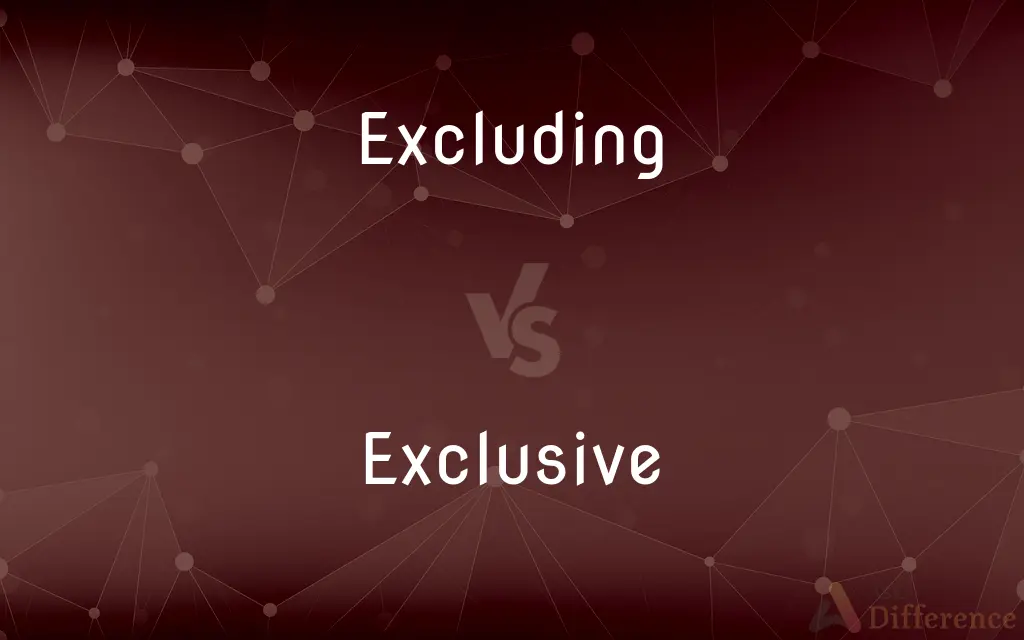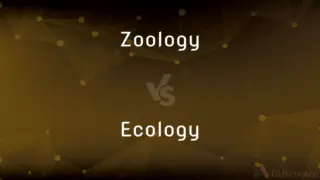Excluding vs. Exclusive — What's the Difference?
Edited by Tayyaba Rehman — By Urooj Arif — Updated on April 2, 2024
Excluding involves deliberately leaving something out, while exclusive refers to something uniquely available to a specific group or purpose.

Difference Between Excluding and Exclusive
Table of Contents
ADVERTISEMENT
Key Differences
Excluding is an action that involves intentionally not including someone or something in a group, list, or activity. It focuses on the act of omission based on specific criteria or decisions. On the other hand, exclusive denotes a state or quality of being limited to certain people or groups, often implying a sense of privilege or uniqueness.
When something is excluding, it is actively separating or removing elements from consideration, emphasizing the process of leaving out. Whereas, exclusive items or experiences are designed to be accessible by a select few, highlighting exclusivity as a defining characteristic.
The concept of excluding can apply in various contexts, such as social situations, data analysis, or decision-making processes, where specific elements are deliberately omitted. In contrast, exclusive is often used to describe access to services, products, clubs, or information that is restricted to a particular group, often for reasons of quality, prestige, or privacy.
Excluding often carries a negative connotation, as it can imply rejection or denial of access or recognition. Exclusive, however, tends to have a positive or neutral connotation, associated with luxury, high status, or specialized access, even though it can also imply a barrier to entry for those not included.
While both terms involve the concept of selectivity, excluding is an action with a focus on the act of omission, and exclusive describes a quality or status that limits availability or access to a select group, reflecting different aspects of inclusivity and accessibility.
ADVERTISEMENT
Comparison Chart
Definition
Act of intentionally leaving out.
Being limited to certain people or groups.
Context
Social situations, data sets, decision-making.
Access to services, products, memberships.
Connotation
Often negative, implying rejection.
Generally positive, implying prestige or uniqueness.
Purpose
To omit based on criteria or decisions.
To restrict access, often for reasons of prestige or privacy.
Focus
The process of omission.
The quality or status of being select or privileged.
Compare with Definitions
Excluding
Act of not including certain elements.
The study's results were skewed by excluding key data.
Exclusive
Implies selectivity or uniqueness.
Access to the database is exclusive to members.
Excluding
Deliberate omission from a group or list.
Excluding her from the meeting was an oversight.
Exclusive
Limited to a specific group or entity.
The club offers exclusive membership benefits.
Excluding
Removal from consideration.
Excluding outliers, the data trend is clear.
Exclusive
Denoting a high level of privacy or luxury.
The resort is known for its exclusive beaches.
Excluding
Specifically omitting details or individuals.
The agreement was clear in excluding any liabilities.
Exclusive
Unique or only available to a few.
They launched an exclusive product line for premium customers.
Excluding
To leave out intentionally.
The recipe improved by excluding salt.
Exclusive
Reserved for a particular purpose.
The interview was exclusive to one news outlet.
Excluding
To prevent from entering; keep out; bar
A jar sealed to exclude outside air.
An immigration policy that excludes undesirables.
Exclusive
Excluding or tending to exclude
Exclusive barriers.
Excluding
To prevent from being included, considered, or accepted; reject
The court excluded the improperly obtained evidence.
Exclusive
Not allowing something else; incompatible
Mutually exclusive conditions.
Excluding
To put out; expel.
Exclusive
Not divided or shared with others
Exclusive publishing rights.
Excluding
Present participle of exclude
Exclusive
Not accompanied by others; single or sole
Your exclusive function.
Excluding
To the exclusion of; not including
Our lucky free draw winner will be treated to dinner, bed and breakfast, but the holiday must be taken before December, 1991 (subject to availability and excluding bank holidays).
Exclusive
Complete; undivided
Gained their exclusive attention.
Exclusive
Not including the specified extremes or limits, but only the area between them
10-14, exclusive.
That is, 11, 12, and 13.
Exclusive
Excluding some or most, as from membership or participation
An exclusive club.
Exclusive
Catering to a wealthy clientele; expensive
Exclusive shops.
Exclusive
(Linguistics) Relating to or being a first person plural pronoun that excludes the addressee, such as we in the sentence Pat and I are in town, so we can meet you for lunch.
Exclusive
A news item initially released to only one publication or broadcaster.
Exclusive
An exclusive right or privilege, as to market a product.
Exclusive
(literally) Excluding items or members that do not meet certain conditions.
Exclusive
(figuratively) Referring to a membership organisation, service or product: of high quality and/or renown, for superior members only. A snobbish usage, suggesting that members who do not meet requirements, which may be financial, of celebrity, religion, skin colour etc., are excluded.
Exclusive clubs tend to serve exclusive brands of food and drinks, in the same exorbitant price range, such as the 'finest' French châteaux.
Exclusive
Exclusionary.
Exclusive
Whole, undivided, entire.
The teacher's pet commands the teacher's exclusive attention.
Exclusive
(linguistics) Of or relating to the first-person plural pronoun when excluding the person being addressed.
The pronoun in "We're going to a party later, but you aren't invited" is an exclusive "we".
Exclusive
Information (or an artefact) that is granted or obtained exclusively.
The editor agreed to keep a lid on a potentially disastrous political scoop in exchange for an exclusive of a happier nature.
Exclusive
A member of a group who exclude others from their society.
Exclusive
(grammar) A word or phrase that restricts something, such as only, solely, or simply.
Exclusive
Having the power of preventing entrance; debarring from participation or enjoyment; possessed and enjoyed to the exclusion of others; as, exclusive bars; exclusive privilege; exclusive circles of society.
Exclusive
Not taking into the account; excluding from consideration; - opposed to inclusive; as, five thousand troops, exclusive of artillery.
Exclusive
One of a coterie who exclude others; one who from real of affected fastidiousness limits his acquaintance to a select few.
Exclusive
A news report that is reported first by one news organization;
He got a scoop on the bribery of city officials
Exclusive
Not divided or shared with others;
They have exclusive use of the machine
Sole rights of publication
Exclusive
Excluding much or all; especially all but a particular group or minority;
Exclusive clubs
An exclusive restaurants and shops
Exclusive
Not divided among or brought to bear on more than one object or objective;
Judging a contest with a single eye
A single devotion to duty
Undivided affection
Gained their exclusive attention
Common Curiosities
What is meant by exclusive?
Exclusive describes something that is restricted to a certain group, often implying uniqueness or privilege.
How do excluding and exclusive differ?
Excluding is an action of omission, while exclusive refers to the state of being limited or unique to certain people or groups.
Is excluding always a negative action?
Often, it has negative connotations due to the implication of rejection, but it can be neutral or positive depending on context, like excluding allergens from a diet.
Why might an organization choose to exclude certain information?
For reasons of privacy, relevance, or to avoid bias in analysis and reporting.
Can a product be exclusive but not excluding?
Yes, a product can be exclusive by being available only to a select group without actively excluding others; the focus is on uniqueness rather than omission.
What does excluding mean?
Excluding refers to the act of intentionally leaving someone or something out.
What makes something exclusive?
Limitations on availability or access based on criteria such as quality, membership, or price, which confer a sense of prestige or uniqueness.
Can an event be both excluding and exclusive?
Yes, an event can be exclusive by being open only to a select group and excluding by intentionally not inviting certain individuals or groups.
How does exclusivity affect consumer behavior?
Exclusivity can create a sense of desire or prestige, often driving higher demand or willingness to pay among consumers.
How is exclusivity marketed?
Through highlighting the uniqueness, limited availability, or superior quality of a product or service to create a sense of desirability.
What role does exclusivity play in brand image?
It can enhance a brand's image by associating it with luxury, quality, and prestige.
Is it possible to be inclusive while maintaining exclusivity?
Yes, by defining clear and fair criteria for access or membership that respect diversity and inclusivity, while still maintaining the unique aspects of the offer.
What are the effects of social exclusion?
Social exclusion can lead to feelings of loneliness, decreased self-esteem, and mental health issues.
How can excluding data affect research outcomes?
It can skew results or lead to incomplete conclusions if key variables or outliers are omitted without valid justification.
What are the implications of exclusive contracts in business?
They can secure mutual benefits for parties involved but may limit competition and consumer choice.
Share Your Discovery

Previous Comparison
Zoology vs. Ecology
Next Comparison
Diazepam vs. TemazepamAuthor Spotlight
Written by
Urooj ArifUrooj is a skilled content writer at Ask Difference, known for her exceptional ability to simplify complex topics into engaging and informative content. With a passion for research and a flair for clear, concise writing, she consistently delivers articles that resonate with our diverse audience.
Edited by
Tayyaba RehmanTayyaba Rehman is a distinguished writer, currently serving as a primary contributor to askdifference.com. As a researcher in semantics and etymology, Tayyaba's passion for the complexity of languages and their distinctions has found a perfect home on the platform. Tayyaba delves into the intricacies of language, distinguishing between commonly confused words and phrases, thereby providing clarity for readers worldwide.














































